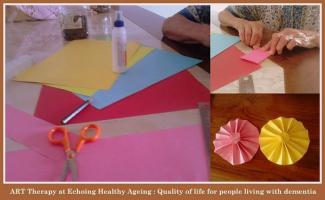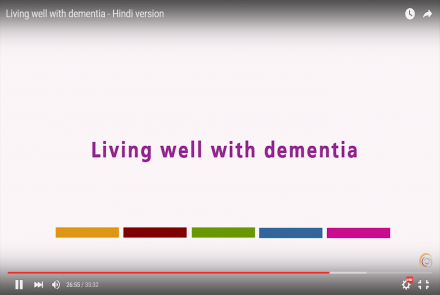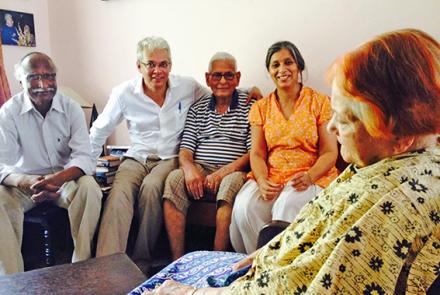
Amrita Patil Pimpale, Dementia Care Consultant, lists out 5 things you can do to help your spouse/partner who has been recently diagnosed with dementia.
Most people with dementia undergo behavioral changes during the course of the disease. They gradually lose their mental faculties and become confused and vulnerable. They tend to forget things that have happened quite recently, but may seem to have clear memory of things that happened a long time ago. They will experience mood changes, can appear to be anxious, often agitated with small issues. This can be difficult, stressful for the caregiver, especially if the person is your spouse. However, diagnosis of dementia does not imply that person has to stop doing activities that they enjoy. With appropriate care and support person with dementia and their spouse can continue to live a quality life.
1. Accept the diagnosis
When your spouse has been diagnosed with a condition that has no cure and is progressive, it is natural that you might be experiencing range of emotions like guilt, grief and loss, even anger.
However, you can lower your stress if you and your family continue to live lives of acceptance, creativity instead of trying to fix the problem or meet impossible expectations. This is the first step for providing good care for your loved one living with dementia. Accept the diagnosis, understand the disease, and learn tips and techniques to work effectively with your spouse who is living with dementia. You can take help and guidance of dementia care books, psychologist, dementia care counsellors who can prepare you better for the upcoming caregiving journey.
You will be playing an important role as a carer for your spouse who may perceive his/her circumstances differently due to memory impairment. Their reality, at times, will not be of present but of past. They may ask for her deceased parents, may struggle to remember important events like retirement, son/daughter’s wedding etc. When you are prepared to deal with situations like this, you can provide empathetic care that can provide your spouse support to deal with their symptoms of dementia.
2. Include the person with dementia in decisions
Do involve your partner as much as possible in decision processes that affect them like buying anything for your partner, deciding on daily routine activities etc. It will persuade him/her to accept and use procedures, devices and make choices that would help them.
However, your spouse may find it confusing to handle bank work or other complex tasks. Here, you will need to help manage many routine errands. Since dementia involves impaired judgement and communication, it is crucial that Person with dementia is provided safe and positive environment to live. Cooking or driving without supervision or going out alone is best avoided for safety of the person with dementia.
3. Key is to have a daily routine
Set up a routine for your spouse that incorporates balanced physical activities like exercise and walking. Besides, regular contact with family and friends, you may however want to avoid going in crowded places as your spouse may prefer to have one to one social contact compared to group conversations. If dementia care professional home visits are available in your area, you may opt for them as they provide stimulating activities, much needed social contact which is proven to reduce anxiety, agitation in people with dementia. It is important that you encourage your spouse to maintain his independence. This can be achieved by letting him/her involve in housework, outings, any hobby of their choice.
4. Set up a support system for yourself
Decide early on how you wish to be involved in the care of your partner. Would you be taking help from professional carers and what kind of help would you require from your family and friends? Think about your own health, other responsibilities while setting up care support system for your spouse.
The caregiver journey is rewarding but at the same time painful, exhausting, and long. You may experience ongoing sadness and grief. But, for the sake of your and your partner’s health, seeking support is perfectly alright. Find a support group in your area that will offer you platform to discuss caregiving issues, receive support, guidance from fellow caregivers who are in similar situations.
Alzheimer’s society’s Talking point is an international online community of caregivers, alternately join our Alzheimer's and Dementia community or our Caregiver community.
5. Look after yourself
It is difficult caring for someone when you don’t feel in good shape yourself, emotionally or physically. You may worry about the person you are caring for or that you are losing control of your life as you increasingly react to external demands placed on you. Try to resolve whatever is causing you to worry, only then can you think positively and productively.
Learn simple ways to calm your mind and body, regular periods of relaxation are essential. This can be achieved by regular social contact with family and friends. Short vacations, movie outings, daytrips could offer you much needed calm and relaxation.
Other than this, I would highly recommend learning quick relaxation techniques, like meditation, breathing exercise, incorporating positive thoughts that can influence your behaviour and will allow you to be more in control of yourself eg “I feel at peace”, “I am content”, ”I am in control of my feelings”.
(Amrita Patil Pimpale, Dementia Care Consultant, is the Founder, Lead Consultant of Echoing Healthy Ageing, a social enterprise working in Dementia care sector, focusing on home based therapies, counselling, dementia care training for family carers and professional in Mumbai. Previously Project Manager of care home improvement project in England. Certified Trainer of Person centred dementia care from University of Bradford, UK; Dementia care mapping advance practitioner and Best practices dementia care from University of Stirling, Scotland. Designed, delivered training for care staff (dementia care), NHS nurses in England and has internationally published research papers in dementia care.
















